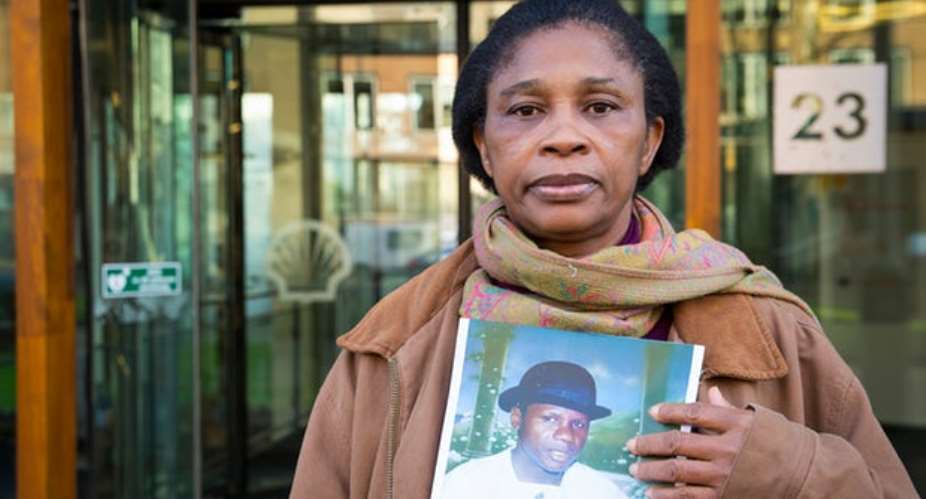The widows of men who were hanged by Nigeria’s military government in the 1990s have launched a civil case against Shell, accusing it of complicity in their husbands’ executions.
Esther Kiobel, the widow of Dr Barinem Kiobel, and three other women whose husbands were hanged in 1995, served a writ in a Dutch court this week, following a 20-year battle with the oil giant.
Kiobel’s husband was executed along with the writer and human rights activist Ken Saro-Wiwa , and seven other men, who became collectively known as the Ogoni nine. They were hanged in a military court following a peaceful uprising by 300,000 Ogonis against Shell’s widespread pollution in Ogoniland.
The men had been convicted of the murder of four leaders in the Ogoni community, who were opponents of the uprisings against Shell. The trial, which was widely discredited, sparked international outrage and led to Nigeria’s suspension from the Commonwealth .
Amnesty International, which has supported Kiobel’s legal team, has accused Shell of complicity in the state executions.
Shell has branded the allegations “false and without merit”.
In a briefing published on Thursday, Amnesty alleges that Shell encouraged security forces and military authorities to stop the protests, even though the company knew this would lead to human rights violations. Amnesty also claims to have seen internal Shell documents proving that the company knew the trial of the Ogoni nine was unfair, and demonstrating that the firm was informed in advance that Saro-Wiwa was highly likely be found guilty.
Shell is alleged to have offered Saro-Wiwa a deal if he “softened his stance” on the company. His brother claims Shell offered to help get his brother freed in August 1995, but that he rejected the offer.
Audrey Gaughran, senior director of research at Amnesty International, said: “Shell had plenty of evidence that the Nigerian military was responding to the Ogoniland protests with abuse.
Kiobel is bringing the case along with Victoria Bera, Blessing Eawo and Charity Levula, whose husbands were also executed. The women are seeking damages and a public apology for the role they allege Shell played in their husbands’ deaths.
Gaughran said the action was a “watershed moment” in their fight for justice. “The executions of the Ogoni nine shocked the world. Shell has been dodging accountability for its complicity in these deaths for more than 20 years but now, thanks to Esther Kiobel’s determination and bravery in taking on this corporate Goliath, the past is finally catching up with it.”
Channa Samkalden, Esther Kiobel’s lawyer, said: “The stakes in this case could not be higher … for Shell.”
In a statement, Shell Petroleum Development Company of Nigeria Limited said: “We have always denied, in the strongest possible terms, the allegations made by the plaintiffs in this tragic case. The executions of Ken Saro-Wiwa and his fellow Ogonis in 1995 were tragic events that were carried out by the military government in power at the time. We were shocked and saddened when we heard the news of the executions.”
The statement added that SPDC appealed to the Nigerian government to grant clemency. “Support for human rights in line with the legitimate role of business is fundamental to Shell’s core values of honesty, integrity and respect for people. We believe that the evidence will show clearly that Shell was not responsible for these tragic events,” it said.
“SPDC has not had an opportunity to review the full report produced by Amnesty International but, based on a summary of its findings made available to us, the Amnesty allegations against Royal Dutch Shell and SPDC are false and without merit. SPDC did not collude with the authorities to suppress community unrest and in no way encouraged or advocated any act of violence in Nigeria. In fact, the company believes that dialogue is the best way to resolve disputes.”





 Galamsey: Five Burkinabes jailed 20 years each for mining
Galamsey: Five Burkinabes jailed 20 years each for mining
 'It's no crime' – Abu Sakara defends Alan's exit from NPP
'It's no crime' – Abu Sakara defends Alan's exit from NPP
 'We know all your houses, pay your bills now or we’ll disconnect you; we're all ...
'We know all your houses, pay your bills now or we’ll disconnect you; we're all ...
 Impacts of air pollution extremely dire – Clean Air Fund
Impacts of air pollution extremely dire – Clean Air Fund
 Lofortoe Chief gives one week ultimatum to Fulani herdsmen to vacate
Lofortoe Chief gives one week ultimatum to Fulani herdsmen to vacate
 2024 elections: A vote for Mahama will turn Ghana's education system upside down...
2024 elections: A vote for Mahama will turn Ghana's education system upside down...
 Dumsor: NPP will be punished in election 2024 if gov't doesn't address current s...
Dumsor: NPP will be punished in election 2024 if gov't doesn't address current s...
 Akufo-Addo directs GRA, Finance Ministry to renegotiate deal with SML
Akufo-Addo directs GRA, Finance Ministry to renegotiate deal with SML
 Kofi Bentil’s love, support for Bawumia will never represent IMANI – Franklin Cu...
Kofi Bentil’s love, support for Bawumia will never represent IMANI – Franklin Cu...
 NPP outperforms NDC in health infrastructure in Ashanti Region — LIPS report
NPP outperforms NDC in health infrastructure in Ashanti Region — LIPS report
